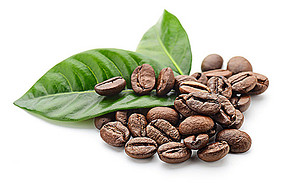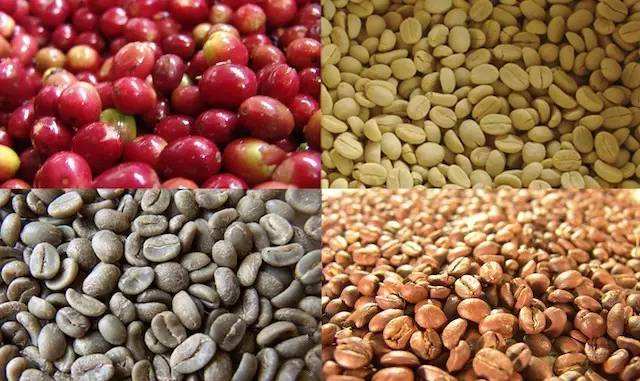Introduction to Coffee Climatic cultivation in Ethiopia
Follow the caf é (Wechat official account vdailycom) and found that Beautiful Cafe opened a small shop of its own.
By the end of the century, climate change may cause about half of Ethiopia's coffee-producing areas to be unsuitable for coffee cultivation. However, the study report is not all bad news, the researchers also suggested that through the transfer of coffee producing areas, afforestation and forest protection, the total area of coffee cultivation is expected to increase fourfold. The related paper was recently published in the online edition of Nature-plants.
Small fruit coffee (Coffea arabica) contributes to the world's major coffee bean production, it originated in Ethiopia, accounting for 1% of the country's export earnings. Therefore, it is necessary to understand the impact of climate change on coffee production, but it is not easy to predict the impact of climate change at the local level.

Justin Moat and colleagues at Kew Royal Botanical Gardens in London, UK, designed different transfer scenarios, using high-resolution climate data and the latest satellite imagery data developed by the World Climate Research Initiative (WCRP) to generate predictions of coffee suitability over four periods-from the 1960s to the 21st century. In this way, they can divide every square kilometer of land in Ethiopia into five categories according to the extent to which coffee is suitable for growing coffee: unsuitable, barely suitable, suitable, good and optimal. Then, in order to verify the accuracy of the model, the researchers drove and walked about 30, 000 kilometers and visited more than 1800 sites between 2013 and 2016.
It was found that by the end of the century, 39% to 59% of the current coffee producing areas may no longer be suitable for growing coffee, a clear indication of the threat posed by climate change. However, the researchers also believe that climate change-related temperature increases may increase coffee-growing areas in Ethiopia over the next 20 years. Finally, they pointed out the most suitable forest areas as a "refuge" for genetic diversity of wild small fruit coffee.
Name and introduction of Coffee Cooperative in Ethiopia
Sigiga Cooperative (1600-2500 m)
Production area: Gedeo-Kochere Kochel
Number of members: 1862
Land attribute: red brown soil
Certificate: Fair Trade Fair Trade, UTZ Sustainable cultivation, Organic Organic Coffee
Finchewan Cooperative (1450-2000 m)
Production area: Gedeo-Wenago vena fruit
Number of members: 1271
Land attribute: red brown soil
Certificate: Fair Trade Fair Trade, Organic Organic Coffee
Konga Conga Cooperative (1750-2300 m)
Production area: Gedeo- Yega Xuefei
Number of members: 1556
Land attribute: red brown soil
Certificate: Fair Trade Fair Trade, Organic Organic Coffee
Hafursa Cooperative (1750-2300 m)
Production area: Gedeo- Yega Xuefei
Number of members: 1975
Land attribute: red brown soil
Annual output of raw coffee beans: 798000 kg
Average farm size: up to 4 hectares with an annual yield of about 600 kg per hectare
The cooperative has a washing station.
Certificate: Fair Trade Fair Trade, Organic Organic Coffee
Resa Cooperative (1000-1400 m)
Production area: Gedeo-Wenago vena fruit
Number of members: 2719
Land attribute: red brown soil
Two sets of coffee processing equipment are available.
Certificate: Fair Trade Fair Trade, Organic Organic Coffee
Addis Katema Cooperative (1000-1400 m)
Production area: Gedeo-Wenago vena fruit
Number of members: 891
The cooperative has a washing station.
Land attribute: red brown soil
Certificate: Fair Trade Fair Trade, Organic Organic Coffee
Biloya Biloya Cooperative (1600-2500 m)
Production area: Gedeo-Kochere Kochel
Number of members: 1203
Land attribute: red brown soil
Two sets of coffee processing equipment are available
Certificate: Fair Trade Fair Trade, Organic Organic Coffee
Worka Waka Cooperative (1650-2700 m)
Production area: Gedeb
Number of members: 305
Land attribute: red brown soil
Annual output of raw coffee beans: 457000 kg
Average farm size: maximum 4 hectares, annual yield of about 699 kg per hectare
The cooperative has all the processing equipment.
Certificate: Fair Trade Fair Trade, Organic Organic Coffee
Koke Cook Cooperative (1750-2300 m)
Production area: Gedeo- Yega Xuefei
Number of members: 828
Land attribute: red brown soil
A set of processing equipment can be provided
Certificate: Fair Trade Fair Trade, UTZ Sustainable cultivation, Organic Organic Coffee
Hama Cooperative (1600-2500 m)
Production area: Gedeo-Kochere Kochel
Number of members: 1505
Land attribute: red brown soil
A set of processing equipment can be provided
Certificate: Fair Trade Fair Trade, Organic Organic Coffee
Chichu Cooperative (1410-2000 m)
Production area: Gedeo-Dila
Number of members: 1675
Land attribute: red brown soil
Average farm size: up to 4 hectares, with an annual yield of about 591 kg per hectare
A set of processing equipment can be provided
Certificate: Fair Trade Fair Trade, Organic Organic Coffee
Michile Cooperative (1410-2000 m)
Production area: Gedeo-Dila
Number of members: 1206
Land attribute: red brown soil
Average farm size: annual yield per hectare is about 592 kg
A set of processing equipment can be provided
Certificate: Fair Trade Fair Trade, UTZ Sustainable cultivation, Organic Organic Coffee
Hase Haro Cooperative (1450-2000 m)
Production area: Gedeo-Wenago vena fruit
Number of members: 1519
Land attribute: red brown soil
Average farm size: up to 4 hectares, with an annual yield of about 591 kg per hectare
A set of processing equipment can be provided
Certificate: Fair Trade Fair Trade, Organic Organic Coffee
Dumerso Dumeso Cooperative (1750-2300 m)
Production area: Gedeo- Yega Xuefei
Number of members: 246
Land attribute: red brown soil
Two sets of processing equipment can be provided.
Certificate: Fair Trade Fair Trade, Organic Organic Coffee
Tumticha Cooperative (1410-2000 m)
Production area: Gedeo- Yega Xuefei
Number of members: 960
Land attribute: red brown soil
Two sets of processing equipment can be provided.
Certificate: Fair Trade Fair Trade, Organic Organic Coffee
Aramo Cooperative (1750-2300 m) (90 + Clinique producing area)
Production area: Gedeo- Yega Xuefei
Number of members: 2254
Land attribute: red brown soil
Two sets of processing equipment can be provided.
Certificate: Fair Trade Fair Trade, Organic Organic Coffee
Edido Ediot Cooperative (1750-2300 m)
Production area: Gedeo- Yega Xuefei
Number of members: 1044
Land attribute: red brown soil
A set of processing equipment can be provided
Certificate: Fair Trade Fair Trade, Organic Organic Coffee
Adame Cooperative (1000-1400 m)
Production area: Gedeo-Wenago vena fruit
Number of members: 533
Land attribute: red brown soil
A set of processing equipment can be provided
Certificate: Fair Trade Fair Trade, Organic Organic Coffee
Belekara Cooperative (1000-1400 m)
Production area: Gedeo-Wenago vena fruit
Number of members: 685
Land attribute: red brown soil
A set of processing equipment can be provided
Certificate: Fair Trade Fair Trade, Organic Organic Coffee
Adado Adado Cooperative (1200-1700 m)
Production area: Sidamo-Bule
Number of members: 1128
Land attribute: red brown soil
A set of processing equipment can be provided
Certificate: Fair Trade Fair Trade, Organic Organic Coffee
Haru Cooperative (1200-1700 m)
Production area: Gedeo- Yega Xuefei
Number of members: 1187
Land attribute: red brown soil
A set of processing equipment can be provided
Certificate: Fair Trade Fair Trade, Organic Organic Coffee
Important Notice :
前街咖啡 FrontStreet Coffee has moved to new addredd:
FrontStreet Coffee Address: 315,Donghua East Road,GuangZhou
Tel:020 38364473
- Prev

The grade of caffeine in Ethiopia
Following Cafe (official Wechat account vdailycom) found that Beautiful Cafe opened a small shop of its own background Ethiopia's coffee bean grading standards are supported by the American Professional Coffee Association. But remember, Ethiopia is a coffee producer, so why can't Ethiopia set its own standards?-in 2008, Ethiopia held a formal coffee trading center.
- Next

How much do you know about the coffee ceremony in Ethiopia?
Following Kaibei (Wechat official account vdailycom) found that Beautiful Cafe opened a small shop of its own Ethiopia is a country with changeable landscapes and diverse ethnic groups, its coffee beans are grown in different regions. The only thing that can be revered by more than 80 ethnic groups is coffee. Only about 40% of Ethiopian coffee is exported, and the rest is used for various forms of rituals.
Related
- Detailed explanation of Jadeite planting Land in Panamanian Jadeite Manor introduction to the grading system of Jadeite competitive bidding, Red bid, Green bid and Rose Summer
- Story of Coffee planting in Brenka region of Costa Rica Stonehenge Manor anaerobic heavy honey treatment of flavor mouth
- What's on the barrel of Blue Mountain Coffee beans?
- Can American coffee also pull flowers? How to use hot American style to pull out a good-looking pattern?
- Can you make a cold extract with coffee beans? What is the right proportion for cold-extracted coffee formula?
- Indonesian PWN Gold Mandrine Coffee Origin Features Flavor How to Chong? Mandolin coffee is American.
- A brief introduction to the flavor characteristics of Brazilian yellow bourbon coffee beans
- What is the effect of different water quality on the flavor of cold-extracted coffee? What kind of water is best for brewing coffee?
- Why do you think of Rose Summer whenever you mention Panamanian coffee?
- Introduction to the characteristics of authentic blue mountain coffee bean producing areas? What is the CIB Coffee Authority in Jamaica?

